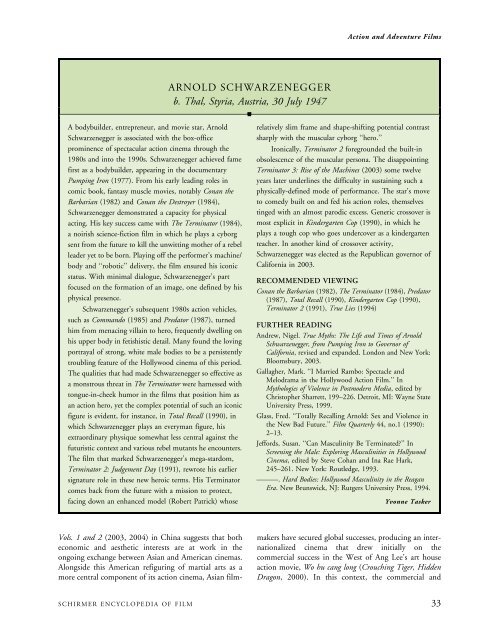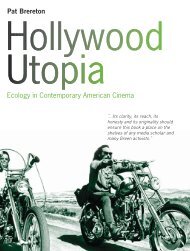Schirmer Encyclopedia of Film
Schirmer Encyclopedia of Film
Schirmer Encyclopedia of Film
You also want an ePaper? Increase the reach of your titles
YUMPU automatically turns print PDFs into web optimized ePapers that Google loves.
A bodybuilder, entrepreneur, and movie star, Arnold<br />
Schwarzenegger is associated with the box-<strong>of</strong>fice<br />
prominence <strong>of</strong> spectacular action cinema through the<br />
1980s and into the 1990s. Schwarzenegger achieved fame<br />
first as a bodybuilder, appearing in the documentary<br />
Pumping Iron (1977). From his early leading roles in<br />
comic book, fantasy muscle movies, notably Conan the<br />
Barbarian (1982) and Conan the Destroyer (1984),<br />
Schwarzenegger demonstrated a capacity for physical<br />
acting. His key success came with The Terminator (1984),<br />
a noirish science-fiction film in which he plays a cyborg<br />
sent from the future to kill the unwitting mother <strong>of</strong> a rebel<br />
leader yet to be born. Playing <strong>of</strong>f the performer’s machine/<br />
body and ‘‘robotic’’ delivery, the film ensured his iconic<br />
status. With minimal dialogue, Schwarzenegger’s part<br />
focused on the formation <strong>of</strong> an image, one defined by his<br />
physical presence.<br />
Schwarzenegger’s subsequent 1980s action vehicles,<br />
such as Commando (1985) and Predator (1987), turned<br />
him from menacing villain to hero, frequently dwelling on<br />
his upper body in fetishistic detail. Many found the loving<br />
portrayal <strong>of</strong> strong, white male bodies to be a persistently<br />
troubling feature <strong>of</strong> the Hollywood cinema <strong>of</strong> this period.<br />
The qualities that had made Schwarzenegger so effective as<br />
a monstrous threat in The Terminator were harnessed with<br />
tongue-in-cheek humor in the films that position him as<br />
an action hero, yet the complex potential <strong>of</strong> such an iconic<br />
figure is evident, for instance, in Total Recall (1990), in<br />
which Schwarzenegger plays an everyman figure, his<br />
extraordinary physique somewhat less central against the<br />
futuristic context and various rebel mutants he encounters.<br />
The film that marked Schwarzenegger’s mega-stardom,<br />
Terminator 2: Judgement Day (1991), rewrote his earlier<br />
signature role in these new heroic terms. His Terminator<br />
comes back from the future with a mission to protect,<br />
facing down an enhanced model (Robert Patrick) whose<br />
Vols. 1 and 2 (2003, 2004) in China suggests that both<br />
economic and aesthetic interests are at work in the<br />
ongoing exchange between Asian and American cinemas.<br />
Alongside this American refiguring <strong>of</strong> martial arts as a<br />
more central component <strong>of</strong> its action cinema, Asian film-<br />
ARNOLD SCHWARZENEGGER<br />
b. Thal, Styria, Austria, 30 July 1947<br />
Action and Adventure <strong>Film</strong>s<br />
relatively slim frame and shape-shifting potential contrast<br />
sharply with the muscular cyborg ‘‘hero.’’<br />
Ironically, Terminator 2 foregrounded the built-in<br />
obsolescence <strong>of</strong> the muscular persona. The disappointing<br />
Terminator 3: Rise <strong>of</strong> the Machines (2003) some twelve<br />
years later underlines the difficulty in sustaining such a<br />
physically-defined mode <strong>of</strong> performance. The star’s move<br />
to comedy built on and fed his action roles, themselves<br />
tinged with an almost parodic excess. Generic crossover is<br />
most explicit in Kindergarten Cop (1990), in which he<br />
plays a tough cop who goes undercover as a kindergarten<br />
teacher. In another kind <strong>of</strong> crossover activity,<br />
Schwarzenegger was elected as the Republican governor <strong>of</strong><br />
California in 2003.<br />
RECOMMENDED VIEWING<br />
Conan the Barbarian (1982), The Terminator (1984), Predator<br />
(1987), Total Recall (1990), Kindergarten Cop (1990),<br />
Terminator 2 (1991), True Lies (1994)<br />
FURTHER READING<br />
Andrew, Nigel. True Myths: The Life and Times <strong>of</strong> Arnold<br />
Schwarzenegger, from Pumping Iron to Governor <strong>of</strong><br />
California, revised and expanded. London and New York:<br />
Bloomsbury, 2003.<br />
Gallagher, Mark. ‘‘I Married Rambo: Spectacle and<br />
Melodrama in the Hollywood Action <strong>Film</strong>.’’ In<br />
Mythologies <strong>of</strong> Violence in Postmodern Media, edited by<br />
Christopher Sharrett, 199–226. Detroit, MI: Wayne State<br />
University Press, 1999.<br />
Glass, Fred. ‘‘Totally Recalling Arnold: Sex and Violence in<br />
the New Bad Future.’’ <strong>Film</strong> Quarterly 44, no.1 (1990):<br />
2–13.<br />
Jeffords, Susan. ‘‘Can Masculinity Be Terminated?’’ In<br />
Screening the Male: Exploring Masculinities in Hollywood<br />
Cinema, edited by Steve Cohan and Ina Rae Hark,<br />
245–261. New York: Routledge, 1993.<br />
———. Hard Bodies: Hollywood Masculinity in the Reagan<br />
Era. New Brunswick, NJ: Rutgers University Press, 1994.<br />
Yvonne Tasker<br />
makers have secured global successes, producing an internationalized<br />
cinema that drew initially on the<br />
commercial success in the West <strong>of</strong> Ang Lee’s art house<br />
action movie, Wo hu cang long (Crouching Tiger, Hidden<br />
Dragon, 2000). In this context, the commercial and<br />
SCHIRMER ENCYCLOPEDIA OF FILM 33
















